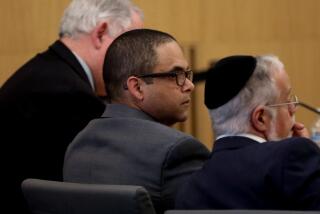What the Ferguson grand jury is secretly trying to decide
- Share via
Everyone has seen some version of a criminal trial in the movies. There always seems to be a moment where a key witness crumbles under a withering cross-examination and admits that he or she is the killer. Or sometimes the case goes to a jury where one stout-hearted person, convinced of the defendant’s innocence, fights against peer pressure and convinces the others to change their minds, saving the accused.
Most people can understand the basic adversarial nature of a public trial decided by what is formally called a petit jury. But there is probably no part more mysterious in the judicial system than a grand jury like the one that is weighing the fate of white police officer Darren Wilson, who fatally shot Michael Brown, an unarmed 18-year-old black man, on Aug. 9 in Ferguson, Mo.
No one really knows what is going on inside the room where the grand jurors are weighing their options. But, based on how grand juries usually work, and statements made by officials in recent months, we have a sense of the process, which is expected to end soon with either charges against the officer or an exoneration.
What is a grand jury and why do we have them?
A grand jury is the body that examines an incident and decides whether to bring charges. It can use its subpoena power to demand that documents be produced, can hear witnesses and weigh the evidence. It can return a “true bill,” or indictment, and the defendant is then arraigned on the charges and guilt or innocence is determined by petit jury. If the grand jury finds that no charges are merited, it can choose not to indict, also known as a “no bill.” In many jurisdictions, grand juries are also used to investigate and issue reports pointing out flaws in official systems.
Isn’t there another way to bring charges?
Yes. In many jurisdictions, after an arrest by police, the defendant can ask for a preliminary hearing instead of a grand jury hearing. Such a hearing is like a public mini-trial before a judge, who can decide whether to hold the defendant. In general, defense lawyers ask for a preliminary hearing because they want to get a peek at the prosecution case at an early phase. It is not unusual for the prosecutors to quickly move to the grand jury, which acts in secret.
Why is the grand jury secret?
Proceedings by grand juries and deliberations of petit juries are secret, held behind closed doors to protect the jurors and give them the privacy to speak freely. But it doesn’t mean the deliberations are forever unknown. Defense attorneys often poll jurors after a verdict -- in part to see if there are grounds to appeal to a higher court -- and will often interview them afterward.
In Ferguson, many want to see the legal proceedings play out in a public trial because of the race relations involved.
Is there a difference in how each type of jury sees the case?
The biggest difference between the juries is the standard under which they operate. A petit jury, the one with which we are all familiar, has to decide to convict beyond a reasonable doubt. This does not mean beyond all doubt. Instead, jurors must be convinced that the prosecution has proven its case beyond the usual doubts of reasonable people.
A grand jury can return an indictment if the evidence shows a probable cause that the person committed the crime. This is a lesser standard than needed by a petit jury to convict. This makes sense because the indictment doesn’t mean that the defendant is guilty of anything, merely charged. To be convicted should require more of a burden of proof than simply being accused.
How many people are on the grand jury?
There are 12 grand jurors sitting on the Ferguson case. They have been meeting in a regular room in Clayton, Mo., the county seat of St. Louis County, which includes the city of Ferguson. This grand jury has one black man, two black women, six white men and three white women.
What have the grand jurors done?
They have listened to witnesses and looked at evidence such as autopsies. It has not been made public how many witnesses have testified, but Officer Wilson reportedly has appeared and told his side of the confrontation with Brown. According to a variety of reports and news conferences, several witnesses are believed to have testified about what appears to be an altercation between Wilson and Brown at the officer’s car. At least one shot was fired with Wilson in the car and hit Brown in the arm. However, that shot did not kill Brown, who fled with Wilson in pursuit, according to reports. Brown either tried to surrender with his hands up or he charged Wilson, according to differing accounts. Wilson fired a volley of shots, including the fatal one.
What are the questions the grand jury must decide?
We have yet to learn all of the details, but there are clearly many questions the jurors are likely to weigh:
What was Wilson doing when he stopped Brown and a friend on a public street? Was there a struggle at the car and what are the details? Did Wilson intentionally kill Brown or was he negligent? Did Wilson use excessive force in firing at least six times to subdue Brown? How far away was Wilson when he fired the fatal shot? Were Brown’s hands up or down? Did Wilson fire out of fear for his life or that Brown would commit violence against others?
What is the range of charges?
The most serious is second-degree murder, which includes the idea of “knowingly causing” death; it is punishable by a prison term of 10 to 30 years. Next is voluntary manslaughter, which means causing a death under the influence of some sort of passion; it carries a penalty of five to 15 years.
There are two involuntary manslaughter charges: First-degree involuntary manslaughter involves recklessly causing a death; second-degree is based on criminal negligence in the death.
The jurors will also have to weigh whether the police officer acted within the rules for law enforcement officers that allow for the use of violence when there is a reasonable belief the suspect will inflict serious harm or if the officer reasonably believes force is needed to prevent death or serious injury.
What is the role of the prosecutors?
The prosecutors serve as advisors to the grand jury. They usually bring in witnesses and often start the questioning. Grand jurors are allowed to ask questions of witnesses. Prosecutors often wield enormous power, and the cliche is that a prosecutor can get a grand jury to indict a ham sandwich. Because of the political overtones of the Ferguson case, prosecutors seem to be presenting both sides -- for example, the autopsy performed by officials and by Dr. Michael Baden, the former New York medical examiner who was hired by the family, have both been given to jurors.
How will jurors decide?
The jurors will weigh the evidence and decide what is believable. Eventually they will discuss and then vote on possible charges. In general, it will take nine votes to decide the issue. How the jurors get to that number is up to them and their discussions. For example, they can decide on a series of votes or try to reach any consensus that might open the door to a lesser charge.
When will the jurors vote?
That is the $64,000 question as the St. Louis area tensely waits.
Follow @latimesmuskal for national news.
More to Read
Sign up for Essential California
The most important California stories and recommendations in your inbox every morning.
You may occasionally receive promotional content from the Los Angeles Times.











